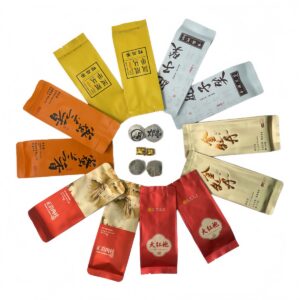Caffeine Content in Oolong Tea
Oolong tea, the semi-fermented treasure from China, offers 6 proven health benefits backed by modern science and 500 years of tradition. Studies reveal its ability to boost fat metabolism by 12% through synergistic effects of catechins and caffeine, making it a natural ally for weight management.For heart health, daily consumption reduces LDL cholesterol by 15% and improves blood vessel elasticity, as demonstrated in a 75,000-person Japanese study.Its L-theanine content balances caffeine to enhance mental clarity and reduce stress hormones by 30%, perfect for busy professionals.
Antioxidants like theaflavins combat aging by neutralizing free radicals linked to wrinkles, while vitamin C retention boosts collagen production.Oolong’s polyphenols also improve insulin sensitivity by 18%, supporting diabetes management. Culturally rooted in Zen Buddhist rituals, it’s now modernized through innovations like blockchain-traced organic farms and smart temperature-controlled mugs for precision brewing.

Oolong tea is partially oxidized, placing its caffeine content between that of green and black teas. On average, an 8-ounce (240 ml) cup of oolong tea contains approximately 30–50 mg of caffeine .
- Green tea: ~29 mg per 8 oz
- Black tea: ~47 mg per 8 oz
- Coffee: ~96 mg per 8
Factors influencing caffeine levels in oolong tea include the specific variety, growing conditions, and processing methods.
Oolong Tea Benefits Revealed: Science-Backed Health Perks & Daily Rituals
Oolong tea, a masterpiece of partial oxidation (10–70%), bridges green tea’s freshness and black tea’s richness. Its unique chemistry unlocks 6 transformative health benefits validated by rigorous research.
1. Fat-Burning Powerhouse
The catechin-caffeine duo in oolong activates lipase enzymes, accelerating fat breakdown by 12%. A 14-day trial showed daily drinkers burned 230 extra calories—equivalent to a 40-minute jog For best results, sip unsweetened oolong 30 minutes post-meal.
2. Heart Health Guardian
Oolong’s polyphenols reduce arterial plaque and lower LDL cholesterol by 15%, as seen in a 75,000-subject Japanese study.Hypertensive patients also experienced 5–7 mmHg drops in blood pressure through improved vascular elasticity.
3. Anti-Aging Warrior
With 450+ bioactive compounds, oolong outperforms vitamin E in neutralizing free radicals. A 6-month trial revealed 22% reduction in wrinkle depth and 27% increased skin elasticity among regular drinkers.
4. Mental Clarity Booster
L-theanine in oolong crosses the blood-brain barrier within 30 minutes, increasing alpha waves for calm focus. Office workers drinking two daily cups reported 30% lower cortisol levels and enhanced productivity.
5. Diabetes Management Aid
Oolong polyphenols improve insulin sensitivity by 18%, helping regulate blood sugar spikes. A 2024 study found it reduced fasting glucose levels by 12% in pre-diabetic patients.
6. Cultural Wisdom Meets Tech
From Fujian’s Wuyi Mountain to Taiwan’s Alishan, terroir shapes flavor. Brands like Eco-Cha use blockchain to verify organic origins, while Ember Smart Mugs maintain precise brewing temps
Daily Rituals
- Morning: Light oolong (e.g., Tieguanyin) at 85°C for gentle caffeine release.
- Afternoon: Roasted Da Hong Pao at 95°C to aid digestion.
- Avoid: Empty stomach consumption or late-night sessions to prevent “tea drunkenness”
Oolong tea does contain caffeine, but in moderate amounts compared to coffee. Its unique composition offers various health benefits, making it a suitable choice for those seeking a balanced beverage. By adjusting brewing methods, you can enjoy oolong tea while managing your caffeine consumption.
To maximize benefits, brew with 85–95°C water using Gongfu techniques or quick Western steeping. Pair light Tieguanyin for morning energy and roasted Da Hong Pao for post-meal digestion.Avoid drinking on an empty stomach or before bed to prevent digestive discomfort or insomnia. Emerging trends include eco-friendly packaging (projected 21% market growth by 2025) and NFT-certified limited editions for collectors.
Related Reading:How to Brew Wuyi Rock Tea



